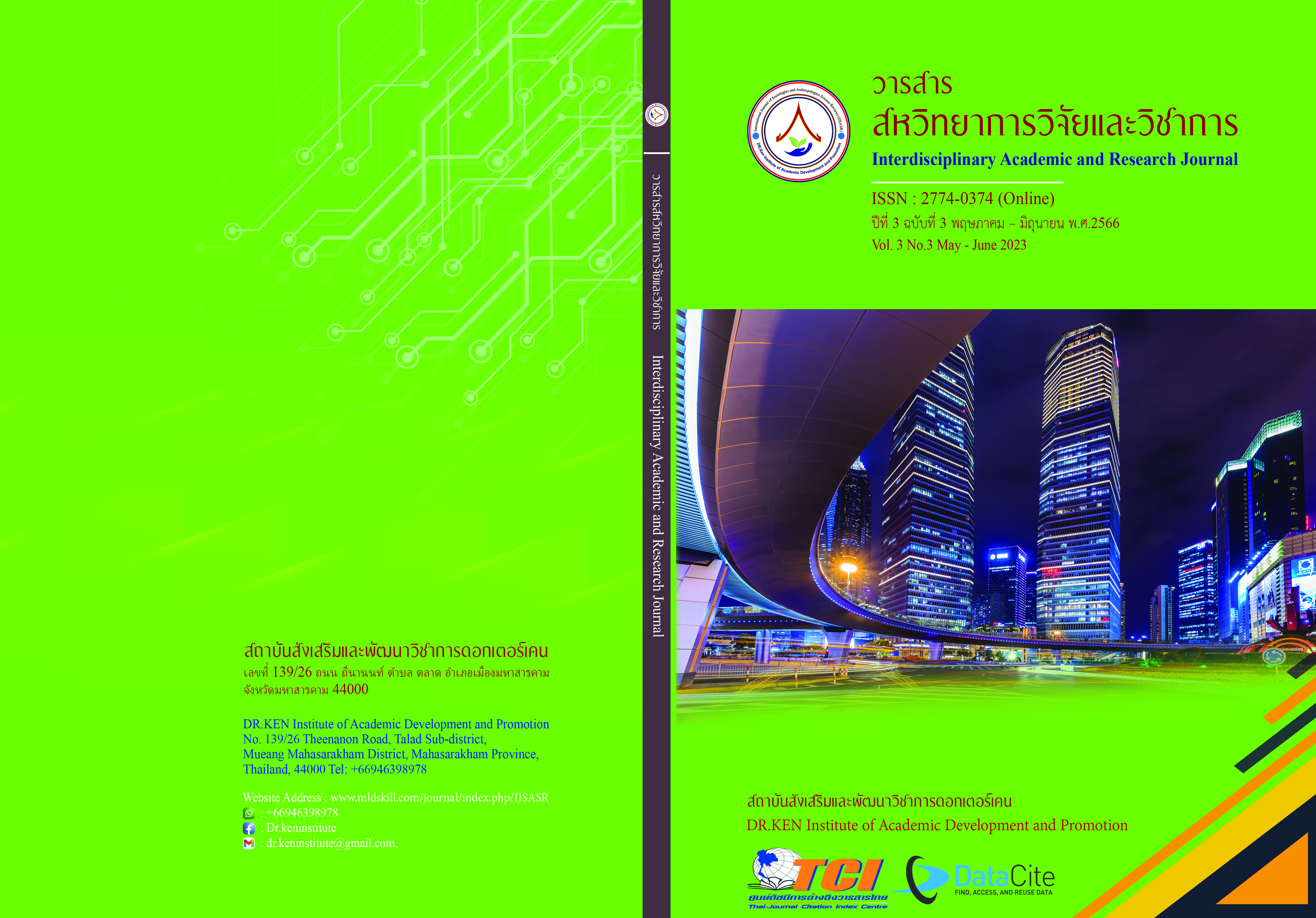A Study of Knowledge of Ethics of Human Research for Classroom Research of Teachers in Wang Thonglang District, Bangkok
DOI:
https://doi.org/10.14456/iarj.2023.158Keywords:
Human Research Ethics; , Classroom ResearchAbstract
Classroom research is social science research that emphasizes the ethics of human research to protect the prestige, rights, welfare, independence, and fairness of research participants. Social science researchers, including teachers, must recognize and respect the ethics of human research. And used as a guideline for the proper conduct of research under the basic ethical principles to ensure that the research is of quality and acceptable. Teachers should know about the ethics of human research. Thus, the purposes of this study were to (1) investigate the knowledge level of teachers in the Wang Thong Lang area in Bangkok regarding human research ethics for classroom research, and (2) compare the knowledge of human research ethics for classroom research among teachers with different educational levels in three schools in Wang Thong Lang area in Bangkok. The sample consisted of 226 teachers selected by stratified random sampling. The research instrument was a knowledge test about human research ethics for classroom research among teachers in the Wang Thong Lang area of Bangkok. Descriptive statistical data were analyzed using mean, standard deviation, maximum and minimum values, and inferential statistical data to compare the means of the two independent groups. The results were that: (1) Teachers in the Wang Thong Lang area, Bangkok, had an average score of knowledge on human research ethics for classroom research of 17.83 out of 30 points; the principles of respect for humanity had the highest mean score followed by the principle of benefit and the principle of justice respectively. (2) The mean level of knowledge of teachers with master's degrees about human research ethics for classroom research was also higher than for those with bachelor's degrees at the.05 level of statistical significance.
References
จิราภรณ์ เอมเอี่ยม. (2548). ปัจจัยที่ส่งผลต่อการทำวิจัยในชั้นเรียนของครูผู้สอน สังกัดสำนักงานเขตพื้นที่การศึกษาพิษณุโลกเขต 3 สำนักงานคณะกรรมการการศึกษาขั้นพื้นฐาน. วิทยานิพนธ์ครุศาสตร-มหาบัณฑิต, มหาวิทยาลัยราชภัฏพิบูลสงคราม.
ชุลีกร ธนธิติกร และ ณัฐรัฐ ธนธิติกร. (2556). จริยธรรมการวิจัยในมนุษย์กับการวิจัยทางสังคมศาสตร์.วารสารวิชาการ มหาวิทยาลัยกรุงเทพธนบุรี, 2(1), 29-35.
เชาวรัตน์ คล้ายสอน และคณะ. (2545). สภาพการทำวิจัยในชั้นเรียนของข้าราชการโรงเรียนมัธยมศึกษา จังหวัดพิษณุโลก. การค้นคว้าอิสระสาขาวิชาการบริหารการศึกษา: มหาวิทยาลัยนเรศวร.
พัชรินทร์ ดวงศรี. (2561). การพัฒนาทักษะการสะท้อนคิดในการสอนภาษาอังกฤษด้วยกระบวนการชี้แนะทางปัญญา: กรณีศึกษานักศึกษาฝึกประสบการณ์วิชาชีพครูสาขาวิชาภาษาอังกฤษ มหาวิทยาลัยราชภัฏเลย. คณะมนุษยศาสตร์และสังคมศาสตร์: มหาวิทยาลัยราชภัฏเลย.
ไพโรจน์ วิไลนุช. (2562). การสร้างจริยธรรมการวิจัยในคนในงานวิจัยสังคมศาสตร์. Journal of Public Relations and Advertising.13(1), 114-126.
ยุพาพร ก้านจักร. (2559). การพัฒนาแบบวัดคุณลักษณะอันพึงประสงค์ด้านมุ่งมั่นในการทำงานสำหรับนักเรียนชั้นมัธยมศึกษาตอนต้น สังกัดสำนักงานเขตพื้นที่การศึกษามัธยมศึกษา เขต 27. ครุศาสตรมหาบัณฑิตสาขาการวิจัยและประเมินผลการศึกษา: มหาวิทยาลัยราชภัฏมหาสารคาม.
ศิริกัญญา วงศ์ภาคำ (2558). การพัฒนาแบบวัดความสามารถในการคิดวิเคราะห์ สำหรับนักเรียนชั้นประถมศึกษาปีที่ 5. ครุศาสตรมหาบัณฑิตสาขาวิจัยและประเมินผลการศึกษา: มหาวิทยาลัยราชภัฏมหาสารคาม.
สาคร สียางนอก. (2557). การพัฒนาแบบวัดทักษะกระบวนการทางคณิตศาสตร์สำหรับนักเรียนชั้นมัธยมศึกษาปีที่ 3.วิทยานิพนธ์ครุศาสตรมหาบัณฑิต. วิทยานิพนธ์ครุศาสตรมหาบัณฑิตสาขาการวิจัยและประเมินผลการศึกษา: มหาวิทยาลัยราชภัฏมหาสารคาม.
สำนักงานคณะกรรมการวิจัยแห่งชาติ. (2562). แนวทางจริยธรรมการทำวิจัยที่เกี่ยวข้องกับมนุษย์. กรุงเทพฯ : สำนักงานคณะกรรมการวิจัยแห่งชาติ.
สำอาง สุดสะอาด. (2559). การพัฒนาแบบวัดความสุขของผู้เรียน สังกัดสำนักงานเขตพื้นที่การศึกษาประถมศึกษาในภาคตะวันออก. วิทยานิพนธ์ครุศาสตรมหาบัณฑิตสาขาวิจัยวัดผลและสถิติการศึกษา: มหาวิทยาลัยบูรพา.
Elisabeth, E., Lisa, B.B., & Robert, T. (2018). A qualitative study of primary teachers’ classroom feedback rationales. Educational Research. 60(2), 189-205.
Hellstrom, L., & Lundberg, A. (2020). Understanding bullying from young people’s perspectives: An exploratory study. Educational Research. 62(4), 414-433.
Horton, P., & Forsberg, C. (2020). Safe spaces? A social-ecological perspective on student perceptions of safety in the environment of the school canteen. Educational Research. 62(1), 95-110.
Keisu, B., & Ahlstrom, B. (2020). The silent voices: Pupil participation for gender equality and diversity. Educational Research. 62(1), 1–17.
Nyanjom, J., & Naylor, D. (2020): Performing emotional labour while teaching online. Educational Research. 63(2), 147-163.
The British Psychological Society. (2014). Code of Human Research Ethics. Leicester: The British Psychologica.189-205.
Thornberg, R. & Delby, H. (2019). How do secondary school students explain bullying? Educational Research. 61(1), 142-160.
White, J., Connelly, G., Thompson, L., & Wilson, P. (2013). Assessing wellbeing at school entry using the Strengths and Difficulties Questionnaire: professional perspectives. Educational Research. 55(1), 87-98.
Downloads
Published
How to Cite
Issue
Section
License
Copyright (c) 2023 ธนัชชา คงเนียม, จุฑาภรณ์ มาสันเทียะ, ดารุณี ทิพยกุลไพโรจน์

This work is licensed under a Creative Commons Attribution-NonCommercial-NoDerivatives 4.0 International License.
Copyright on any article in the Interdisciplinary Academic and Research Journal is retained by the author(s) under the under the Creative Commons Attribution-NonCommercial-NoDerivatives 4.0 International License. Permission to use text, content, images, etc. of publication. Any user to read, download, copy, distribute, print, search, or link to the full texts of articles, crawl them for indexing, pass them as data to software, or use them for any other lawful purpose. But do not use it for commercial use or with the intent to benefit any business.
















.png)


